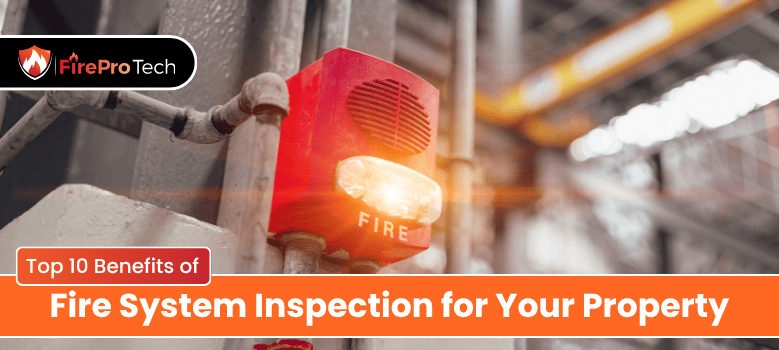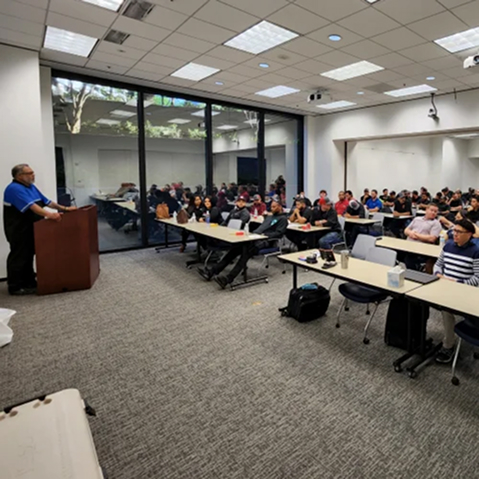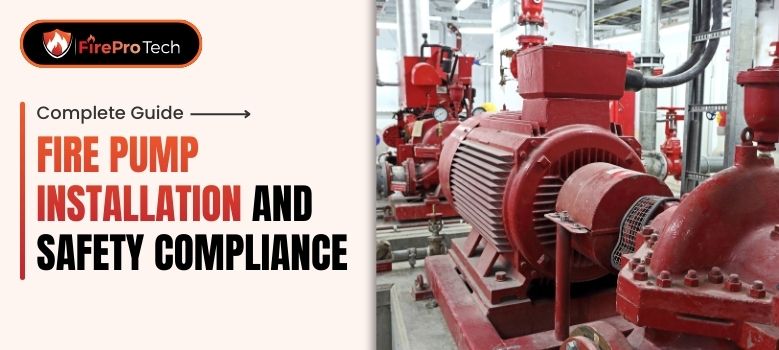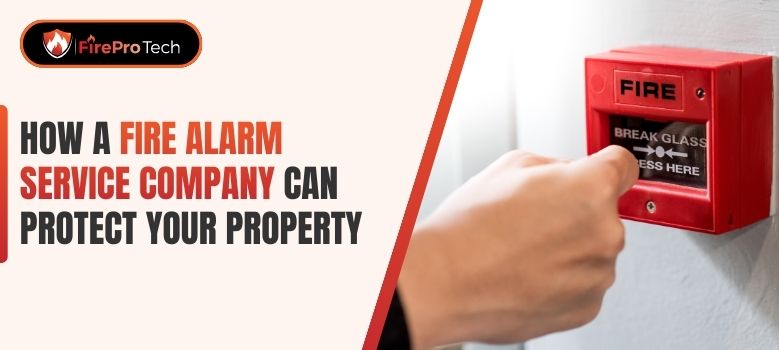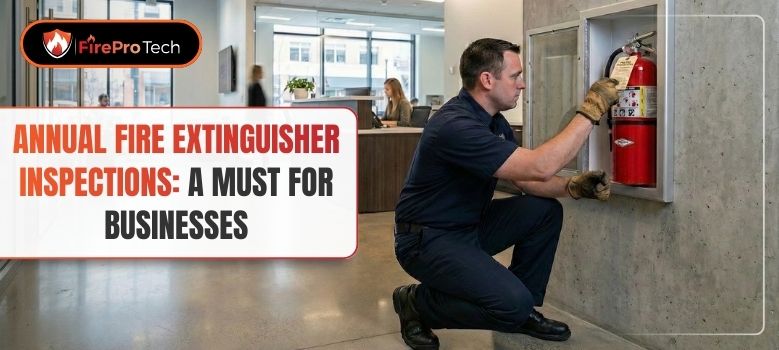A thorough fire system inspection is one of the most important safeguards property owners can implement to protect both people and property. Fires don’t wait for the right moment—they strike unexpectedly, and when they do, the effectiveness of your fire protection systems can mean the difference between minor damage and a devastating loss.
Yet, too often, inspections are overlooked or delayed. Whether you’re managing a commercial building, overseeing a multifamily housing complex, or owning a standalone facility, staying proactive with regular fire inspection services is essential. These inspections ensure that fire alarms, sprinkler systems, suppression units, and emergency lighting remain fully functional, compliant with fire codes, and ready to respond instantly.
In this article, we’ll explore ten key benefits of fire system inspection, helping you understand why routine evaluations aren’t just a regulatory requirement—they’re a cornerstone of comprehensive fire safety. Each benefit we cover reinforces the importance of working with experienced inspection providers like FirePro Tech, LLC to maintain system performance and prevent future liability.
Why Fire System Inspection Matters
Staying current with fire system inspection isn’t just about checking boxes—it’s about maintaining a reliable, life-saving infrastructure within your property. A functioning fire protection system operates like an orchestra: each component must perform its role on cue to contain or extinguish fires, alert occupants, and give first responders critical response time.
Meeting Regulatory and Legal Requirements
Fire safety codes established by the National Fire Protection Association (NFPA) and enforced by local authorities mandate routine inspections for all fire protection systems. These codes dictate the frequency and scope of inspections across various components—ranging from quarterly fire sprinkler system inspections to semi-annual fire suppression system inspection routines and annual fire alarm system assessments.
Non-compliance doesn’t just invite citations and fines; it exposes your business to unnecessary risks, including denied insurance claims in the event of fire-related damages.
Insurance Compliance and Financial Protection
Insurance providers often require documented fire system inspection reports as part of their risk assessment criteria. Missing even a single scheduled inspection could jeopardize your coverage or increase premiums. Conversely, regular inspections signal responsible risk management, which can contribute to favorable policy terms and faster claims processing after an incident.
By partnering with reputable fire system inspection companies like FirePro Tech, LLC, you not only meet these insurance requirements but also gain peace of mind knowing that each part of your system is evaluated and documented thoroughly.
Keeping Systems Fully Operational
Inspections help ensure that every system—whether it’s your fire alarm, kitchen fire suppression system, or sprinkler system—is functioning correctly. Regular testing detects failing components, deteriorated parts, and signal communication failures before they become critical threats. This is particularly vital in areas like server rooms, commercial kitchens, and warehouses, where system reliability must be absolute.
Call Now for a Free Quote – Protect People and Property
Benefit 1: Life Safety and Early Fire Control
Among all the benefits of fire system inspection, none is more urgent or profound than protecting human life. A fire can spread in minutes. Well-inspected fire protection systems provide early alerts, suppress flames before they grow, and support safe evacuation—all of which drastically reduce the chance of injury or death.
Prompt Detection Through Fire Alarm System Inspection
Fire alarm system inspection ensures your detectors, sensors, and control panels are communicating effectively. A smoke or heat detector that malfunctions due to dust buildup or electrical issues may fail to alert occupants in time. Regular inspections allow technicians to calibrate sensors, confirm signal integrity, and validate system responsiveness, thereby enabling earlier evacuation and faster response by emergency services.
Containment Through Fire Sprinkler System Inspection
Properly functioning sprinklers can suppress or extinguish fires before they escalate. During a fire sprinkler system inspection, professionals test pressure levels, check for obstructions, and confirm the condition of sprinkler heads. Even a partially blocked or corroded sprinkler can mean the difference between a contained fire and a full-scale blaze. Regular inspections ensure your sprinklers are ready to activate at the earliest sign of elevated heat.
Targeted Suppression With Kitchen Fire Suppression System Inspection
In high-risk zones such as commercial kitchens, grease fires can ignite with little warning. A kitchen fire suppression system inspection focuses on ensuring discharge nozzles, activation links, and gas shut-off valves are operating correctly. These inspections are critical to mitigating one of the most common sources of structural fires in food-service environments.
Supporting Emergency Lighting and Egress
Although not often top of mind, emergency lighting inspections are also part of holistic fire system inspection protocols. Proper illumination during an emergency evacuation saves lives, especially in high-occupancy or low-visibility environments. Ensuring that exit signs and pathway lighting function correctly plays a crucial role in directing people to safety.
Fire system inspection is not a one-time task; it’s a recurring, high-impact investment in human life. As you’ll see in the following sections, this investment also yields benefits in property preservation, financial stability, and regulatory peace of mind—all of which reinforce the importance of choosing FirePro Tech, LLC as your inspection partner.
Read Also: Choose the Best Emergency Lighting Service for Your Business
Benefit 2: Property Protection and Damage Minimization
Beyond safeguarding lives, one of the most compelling advantages of consistent fire system inspection is the preservation of property and physical assets. Fires, if unchecked, can inflict irreversible damage within minutes. However, properly maintained and regularly tested systems can slow or suppress fires quickly, significantly limiting both direct and collateral damage.
Rapid Activation From Sprinkler Systems
When a fire breaks out, time is everything. A properly conducted fire sprinkler system inspection confirms that water flow alarms, valves, gauges, and heads are in perfect working condition. This ensures that, when triggered, the sprinkler system activates without delay. Early suppression from an efficient system can contain the fire to its point of origin, preventing it from spreading to other parts of the building or impacting structural integrity.
Targeted Protection With Kitchen Suppression Systems
In commercial kitchens, the threat of grease and oil-based fires is ever-present. A kitchen fire suppression system inspection plays a vital role in ensuring targeted discharge mechanisms work seamlessly under high heat conditions. These systems are designed to shut down fuel sources and smother flames using chemical agents. Without regular inspection, even minor blockages or mechanical failures could lead to a system malfunction and greater fire spread.
Smoke and Heat Detection Accuracy
While alarm systems may not directly suppress a fire, their role in early detection is invaluable. Fire alarm system inspection ensures accurate calibration of heat sensors and smoke detectors, which alerts building occupants and fire services in the earliest possible stage. A properly functioning alarm can mean the difference between a contained incident and widespread destruction.
Protecting Inventory, Equipment, and Structural Assets
Many commercial properties contain expensive equipment, archived data, or high-value inventory. A comprehensive fire system inspection helps prevent these assets from being exposed to fire or excessive water damage by triggering swift response mechanisms. Even components like fire dampers and clean agent systems—often used in IT rooms or laboratories—must be regularly evaluated to ensure effective operation in high-sensitivity environments.
Benefit 3: Compliance With Codes and Avoidance of Penalties
Fire protection systems must adhere to strict local and national fire codes. Routine fire system inspection is not just a best practice—it’s a legal obligation. Compliance protects your organization from fines, penalties, and operational disruptions that can arise from code violations or failed safety audits.
Understanding NFPA and Local Requirements
The National Fire Protection Association (NFPA) sets comprehensive guidelines for inspection frequency, component testing, and system documentation. These guidelines form the foundation of many local fire codes. For example, quarterly fire sprinkler system inspection, semi-annual fire suppression system inspection, and annual fire alarm system inspection may all be required depending on your property type and use.
Failure to perform these inspections on schedule can lead to citations, occupancy restrictions, or even business shutdowns. A professional fire system inspection ensures full alignment with these evolving standards and helps keep your property in good standing with fire marshals and building inspectors.
Mitigating Legal and Financial Risks
If a fire-related incident occurs and your inspection history is incomplete or outdated, legal and insurance liabilities can escalate quickly. Courts may interpret a lack of fire system inspection as negligence, especially in cases where occupant injury or extensive property damage occurs. Insurance providers can also deny claims based on non-compliance.
Working with experienced fire system inspection companies like FirePro Tech, LLC ensures that each inspection is properly documented, timestamped, and aligned with the latest jurisdictional requirements. This not only keeps your facility safe but also minimizes exposure to financial and legal repercussions.
Avoiding Business Interruptions
Unannounced fire department inspections are common, especially in commercial and multi-use buildings. If deficiencies are found—such as corroded sprinkler heads, expired suppression agents, or inactive alarm panels—you may be required to cease operations until issues are resolved. Scheduled fire system inspection helps avoid these unwelcome surprises and keeps your operations running smoothly.
Benefit 4: Reduced Insurance Premiums and Liability Exposure
Another powerful incentive for ongoing fire system inspection is the potential to reduce insurance costs while also minimizing liability exposure. Insurance companies are deeply invested in risk mitigation, and they view proactive fire safety practices as a key indicator of a well-managed property.
Gaining Favorable Policy Terms
Many insurers provide rate discounts to property owners who conduct regular inspections of all fire protection components. This includes fire sprinkler system testing and inspection, alarm verification, and suppression system maintenance. These discounts are not merely goodwill—they reflect the statistically proven lower risk associated with well-maintained fire protection systems.
To qualify, most carriers require official inspection records from certified professionals. A detailed fire system inspection log—complete with photos, notes, and timestamps—can serve as proof of compliance and help your facility access these savings.
Preventing Coverage Gaps
In the event of a fire, one of the first things an insurer will examine is whether you upheld your safety responsibilities, which is especially important for businesses utilizing Fire Protection Services in Brenham. If fire suppression system inspection records are missing or your alarm testing is out of date, your claim may be denied or reduced. By partnering with a trusted provider like FirePro Tech, LLC, you ensure that all inspection documentation is in place and accessible if needed.
Lowering Legal Liability in Case of Fire Incidents
Even with insurance coverage, lawsuits can emerge from fire-related injuries or losses. Tenants, customers, and employees may hold you accountable if it’s discovered that a fire system inspection was skipped or performed improperly. Demonstrating that your systems were inspected regularly and by qualified professionals significantly strengthens your legal defense and reduces potential settlements or judgments.
Book Your Inspection Today – Ensure Safety and Compliance
Benefit 5: Early Detection of Issues and Cost Savings on Repairs
One of the most practical advantages of scheduling regular fire system inspection is its ability to catch small problems before they escalate into expensive emergencies. Like any mechanical system, fire protection components experience wear, corrosion, and degradation over time. Without early intervention, these minor issues can result in costly repairs, emergency service calls, or even full system replacements.
Identifying Hidden Problems in Sprinkler Systems
During a routine fire sprinkler system inspection, trained technicians can identify early signs of corrosion inside pipes, mineral buildup, or misaligned sprinkler heads. These issues often go unnoticed until the system fails to activate or causes water damage. Catching these problems early allows for targeted, low-cost fixes that preserve the integrity of the entire system.
Fire sprinkler system testing and inspection also confirms flow rates, alarm signaling, and valve performance. If a valve sticks or a flow switch malfunctions during a fire, the entire sprinkler system may fail to engage. Regular inspections prevent these dangerous and costly outcomes by ensuring operational reliability at every level.
Preventing Kitchen Suppression Failures
In a commercial kitchen, grease accumulation can obstruct discharge nozzles in the fire suppression system. A scheduled kitchen fire suppression system inspection detects these obstructions and allows for immediate cleaning or part replacement. This not only avoids an ineffective discharge during a fire but also prevents additional fire damage to kitchen equipment, appliances, and food storage areas.
Avoiding False Alarms and Emergency Downtime
Alarm system malfunctions are more than just an annoyance. A false fire alarm can disrupt business operations, trigger unnecessary evacuations, and even incur fines from local authorities. Fire alarm system inspection identifies faulty detectors, outdated panels, and wiring issues before they trigger false alerts. This minimizes business interruptions and protects your budget from avoidable penalties.
Preventive maintenance driven by thorough fire system inspection is a long-term cost-saving strategy. Rather than waiting for a component to fail and scrambling for emergency repairs, inspections allow you to plan upgrades, repairs, and replacements in a controlled and affordable way.
Benefit 6: Extended Lifespan of Fire Protection Systems
Every fire protection system has a defined service life, but that lifespan can be significantly extended with regular care. Much like routine oil changes extend the life of a car engine, ongoing fire system inspection ensures that each part of the system remains clean, functional, and efficient over time.
Prolonging Sprinkler System Durability
A fire sprinkler system inspection includes flushing pipes, checking water pressure, and verifying the condition of system components. Without these actions, mineral deposits and microbial corrosion can build up, damaging pipes and shortening the life of the system. Regular inspection, especially five-year internal pipe inspections, can prevent buildup and extend the viability of your sprinkler network by many years.
Replacing a full sprinkler system is a costly and disruptive process. By investing in periodic inspections, property owners can maximize the return on their original installation and avoid premature replacements.
Sustaining Suppression System Performance
Fire suppression systems, particularly those using clean agents or dry chemicals, require regular maintenance to remain effective. A fire suppression system inspection ensures tanks are pressurized correctly, seals are intact, and nozzles are clear of debris. This attention to detail keeps the system primed for use while delaying the need for component replacement or recharging.
Kitchen fire suppression system inspection also contributes to system longevity by preventing clogs and corrosion that often result from the harsh conditions inside a commercial cooking environment.
Preserving Alarm System Electronics
Like any electronic system, fire alarm panels and detectors are sensitive to environmental factors such as dust, humidity, and electrical surges. A fire alarm system inspection helps identify early signs of wear, such as sensor drift or panel glitches, and allows for reprogramming or replacement of affected parts. This not only improves short-term reliability but also prolongs the lifespan of the entire system by keeping it running under optimal conditions.
When your fire protection systems are regularly inspected and maintained, they age more gracefully, perform more reliably, and save you money in both short-term repairs and long-term replacement.
Benefit 7: Operational Readiness and Reliability
A fire protection system is only useful if it works the moment it’s needed. Unfortunately, many system failures occur not because of poor design, but because the system wasn’t inspected, tested, or maintained properly. Fire system inspection ensures that every component is prepared to perform at full capacity in an emergency.
Ensuring Sprinkler System Activation
Sprinklers that have not been inspected can suffer from stuck valves, clogged heads, or sediment buildup. A fire sprinkler system inspection simulates system engagement and checks that activation occurs as designed. This guarantees that, when triggered, the system suppresses the fire without delay or failure.
Fire sprinkler system testing and inspection also evaluates the system under pressure, ensuring that leaks don’t compromise effectiveness during critical moments.
Verifying Alarm Accuracy and Communication
A fire alarm system inspection focuses on testing the functionality of smoke detectors, pull stations, strobe lights, and annunciators. These tests ensure that alerts are activated quickly and that emergency communication is transmitted clearly. Any delay in detection or confusion in messaging could cost valuable time during a fire.
A well-inspected alarm system also improves communication with emergency services, ensuring that dispatchers receive accurate information and arrive prepared to act quickly.
Readiness of Suppression Systems in Specialized Areas
For properties with specific risk zones—such as kitchens, laboratories, or mechanical rooms—targeted fire suppression system inspection verifies that these systems are not only intact but also tailored to the evolving layout of the space. For example, repositioned cooking equipment may require adjustments to nozzle direction or coverage zones. Inspection ensures every part of the system is aligned with current risks and ready to respond.
Working with experienced fire system inspection companies like FirePro Tech, LLC ensures that all inspections are carried out thoroughly, tested rigorously, and backed by technical reporting that validates system readiness. When a fire occurs, you won’t wonder if your systems will work—you’ll know they will.
Benefit 8: Peace of Mind for Property Owners and Occupants
Peace of mind is an often-overlooked benefit of regular fire system inspection, but it plays a significant role in building confidence among owners, managers, employees, and tenants. Knowing that all fire protection components are up-to-date, fully functional, and legally compliant creates a strong sense of security across your entire property.
Confidence in Safety Systems
Routine fire system inspection removes the guesswork from fire safety. It assures you that your alarms, suppression systems, sprinklers, and emergency lighting are tested, verified, and ready to perform. Whether you’re walking into the office each morning or locking up after hours, you can feel confident that your property is protected against unforeseen fire risks.
This sense of assurance extends to tenants, visitors, and employees, who rely on you to maintain a safe environment. When they know inspections are conducted by professionals like those at FirePro Tech, LLC, their trust in the property—and in your leadership—grows stronger.
Reduced Anxiety During Emergency Events
Fires are stressful and potentially life-threatening events. During such emergencies, the last thing anyone wants to worry about is whether the fire alarm will sound or if the sprinklers will engage. A comprehensive fire system inspection minimizes this uncertainty, allowing everyone to focus on evacuation and safety procedures instead of system reliability.
For property managers and facility directors, this level of preparedness translates into smoother crisis management, more effective coordination with fire departments, and ultimately, faster recovery after an incident.
Supporting a Culture of Responsibility
Regular fire system inspection also reflects a commitment to safety and operational integrity. This commitment sets a tone of accountability throughout your organization, encouraging staff to follow safety protocols and report issues more proactively. When leadership prioritizes fire protection, it becomes part of the workplace culture—reducing risk from both equipment failure and human error.
Read Also: Emergency Lights Inspection Checklist for Safety Compliance
Benefit 9: Professional Accountability from Fire System Inspection Companies
Entrusting your inspections to qualified fire system inspection companies brings a level of expertise, consistency, and professionalism that cannot be matched by in-house efforts alone. These specialists follow strict industry protocols, apply advanced testing tools, and provide legally compliant documentation to support your fire protection program.
Trained Technicians With Industry Certifications
Certified technicians from experienced providers like FirePro Tech, LLC bring deep knowledge of fire protection standards. They understand the nuances of each system type, whether it’s a commercial fire sprinkler setup, a kitchen fire suppression system, or a building-wide alarm system. Their certifications ensure that your fire system inspection meets NFPA, local code, and insurance expectations.
This professional insight is especially valuable when dealing with complex configurations or high-risk environments. Rather than relying on general maintenance staff, you receive a specialized assessment that highlights both technical performance and compliance status.
Detailed Documentation and Reporting
A key deliverable of every fire system inspection is a comprehensive report that outlines the condition of each component, test results, and any deficiencies found. These reports serve as your record of compliance, your roadmap for repairs, and your legal defense in case of audits or incidents.
Professional inspection companies organize this data clearly, often providing digital logs and historical performance trends. This level of transparency ensures that you’re always aware of your system status and ready for any fire marshal visits or insurance evaluations.
Accountability for Follow-Up and Repairs
Working with a reputable fire system inspection company also gives you a partner in follow-through. If an issue is discovered—such as a blocked sprinkler head or an expired chemical agent—your provider will flag it, recommend solutions, and often complete the necessary repairs or replacements. This continuity ensures that your fire protection remains uninterrupted and reliable at all times.
Benefit 10: Customization of Inspection Frequency and Service Packages
Not all buildings or systems require the same inspection schedule. One of the most strategic benefits of working with a professional provider is the ability to customize your fire system inspection plan to match your unique facility, usage patterns, and regulatory obligations.
Read Also: Fire Code Renewal Compliance: What Businesses Need to Know
Aligning Inspection Frequency With System Requirements
NFPA and local codes outline specific inspection intervals for different fire protection systems. For instance, a fire sprinkler system inspection may be required quarterly or annually, depending on the system type and property classification. A kitchen fire suppression system inspection often follows a semi-annual schedule, especially in high-use commercial kitchens. Fire alarm system inspection is typically annual but may include more frequent testing of communication links or detection devices.
With a customized plan, you don’t have to guess or remember these intervals. Your inspection provider tracks all deadlines and ensures timely service, reducing the risk of missed inspections or violations.
Tailoring Services to Building Type and Occupancy
Every facility has different risk levels. A warehouse storing combustible materials will have vastly different needs compared to a school, office, or restaurant. Fire system inspection companies assess these risks and design service packages that prioritize the systems most critical to your building’s safety.
This targeted approach enhances your protection while ensuring cost-efficiency. You invest where it matters most—whether that means monthly sprinkler checks, specialized fire suppression system inspection, or in-depth alarm testing.
Streamlining Multi-System Coordination
Many properties include a combination of systems: sprinklers, alarms, suppression units, emergency lighting, and more. Without a coordinated inspection plan, managing these components can become fragmented and inefficient. FirePro Tech, LLC streamlines this process by providing bundled inspection services, ensuring each system is evaluated and documented under one cohesive schedule.
This not only simplifies your responsibilities but also improves the consistency and reliability of your fire protection infrastructure across the board.
Read Also: How Commercial Fire Safety Inspections Protect Your Business
Explore Service Area:
Wrapping Up
Routine fire system inspection is not just about following codes—it’s about ensuring that your building is equipped to handle fire risks effectively, consistently, and confidently, especially for those relying on Fire Protection Services in Bunker Hill Village. From early detection to swift suppression, every component in your system must be reliable. These inspections validate system performance, reduce liability, extend equipment life, and provide invaluable peace of mind.
As we’ve seen, regular inspection benefits both property and people. It minimizes damage, lowers insurance costs, and ensures operational readiness when it matters most. Perhaps most importantly, it establishes a culture of responsibility and preparedness throughout your facility.
Partnering with a trusted provider like FirePro Tech, LLC ensures your fire system inspection is carried out by experienced professionals who understand what’s at stake. Let their expertise guide you toward a safer, more compliant future—because when fire strikes, preparedness is everything.

